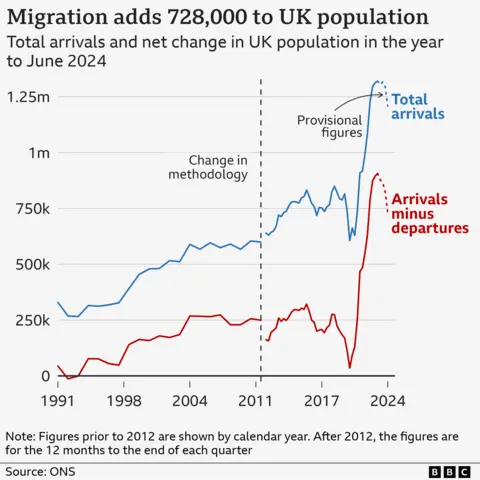Warning: Undefined array key "dirname" in /home/anapuafm/public_html/wp-content/themes/anapuafm/include/plugin/filosofo-image/filosofo-custom-image-sizes.php on line 133
Warning: Undefined array key "extension" in /home/anapuafm/public_html/wp-content/themes/anapuafm/include/plugin/filosofo-image/filosofo-custom-image-sizes.php on line 134
No more Care work recruitment from abroad says UK Home Secretary
Care workers will no longer be recruited from overseas as part of a crackdown on visas for lower-skilled workers, the home secretary has told the BBC.
Yvette Cooper said it is “time to end that care worker recruitment from abroad” and rules will change this year – instead requiring firms to hire British nationals or extend visas of overseas workers already in the country.
The government plans to unveil changes to visa and recruitment laws on Monday in a bid to cut net migration, and says measures will cut up to 50,000 lower-skilled and care workers coming to the UK over the next year.
Shadow home secretary Chris Philp said the plans were “too little” and called for an annual cap on migration.
Successive governments have tried unsuccessfully to reduce net migration, which is the number of people coming to the UK minus the number leaving.
Net migration climbed to a record 906,000 in June 2023, and last year it stood at 728,000.
The Home Office has not yet officially confirmed what will be in its immigration White Paper, due early next week.
Speaking on the BBC’s Sunday with Laura Kuenssberg, Cooper said the government “was setting up plans for a substantial reduction in net migration” but added targets would not be set, saying “they undermined the credibility of anything that governments do”.
The threshold for skilled visas is expected to be increased to graduate level, tightened from the current A-level measure.
There will also be a “narrower” list of exceptions to the rules for temporary shortage visas in some industries, Cooper said, but did not give examples.
Currently, roles considered to be in short supply in the UK like carpenters, graphic designers and pharmaceutical technicians can be placed on the Immigration Salary List (ISL), allowing employers to hire overseas workers at discount – set at 80% of the market rate.
Cooper said the government expects those changes will “lead to a reduction of up to 50,000 fewer lower skilled visas over the course of the next year”.

As well as visa changes, the home secretary added there would be new requirements for training commitments “to get people who are not working back into the labour market here in the UK”.
Philp – who said he agreed with the plan to end care worker recruitment from abroad – told the same programme the Conservatives would push Parliament to vote on a yearly migration cap this week.
When asked what the cap would be, he said “we’re working on the detail to specify that number”, but it would be “a further reduction of significantly more than 50,000”.
He argued that if Labour had stuck with Tory changes net migration would have dropped “by about 400,000”.
Cooper also said there would be “some changes” to rules around international students and graduates.
“We will let them continue to come and to stay and to work afterwards,” she added.
“We are making some changes, particularly around the standards and the compliance for universities, because, again, we’ve had problems where some universities haven’t had proper standards in place.
“They’ve recruited people to come as international students who then haven’t completed their courses, have either overstayed or… other problems with compliance of the system.”
The government has already tightened rules around care sector worker after coming to power last July.
Applications for Health and Care Worker visas peaked at 18,300 in August 2023, then collapsed to 1,700 by April this year following the ban on bringing dependants.
And on 9 April, an additional restriction was added requiring care firms who want to recruit a new worker from overseas to prove they attempted to recruit a worker from within England first.
But the new rules will require care companies to recruit from domestic workers or a pool of over 10,000 care workers brought to the UK on visas for jobs that never materialised.
Alongside this Cooper promised “to bring in a new fair pay agreement for care workers” to make care jobs more attractive to UK workers and reduce overseas demand.
Nadra Ahmed, the National Care Association’s executive chairman, told the BBC the changes would a “challenging scenario” for care homes even “worse”.
She said providers “always prefer to have a domestic workforce” but said it was not available.
Responding to the changes, the Liberal Democrats social care spokesperson Helen Morgan said the government was “tinkering around the edges yet failing to properly tackle the crisis in our social care”.
“Labour must step up and take proper action to address recruitment shortages including paying our care workers properly and rolling out a plan for career progression,” she said.
While Labour have been reviewing migration policy for months, many have suggested this week’s crackdown was triggered by Reform UK’s surge in the local elections, where it took the Runcorn and Helsby constituency off Labour and won control of 10 councils.
Reform leader Nigel Farage claimed “this new legislation is only happening because Reform is leading in the polls”.
Labour’s plan was “doomed to fail”, he argued as immigration was “not just about what numbers come in but who comes in and if they can assimilate”.
Source: BBC




